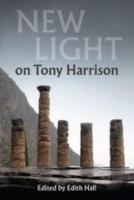
OUP (2019) h/b 245pp £45 (ISBN 9780197266519)
Tony Harrison’s work deserves to be widely known among classicists. His early translations of Palladas (1975), and later in US Martial (1989) reveal a deft hand at epigram, his Oresteia, Trackers of Oxyrhynchus (1991) and other works for stage contain some of his best poetry, while he has featured Orpheus (2000), the Gorgon (1992) and Prometheus (1998) on film. His sequence of Sonnets (from The School of Eloquence and Continuous) vividly recalls experiences from his classical education at Leeds Grammar School. On his eightieth birthday Salts Mill published Polygons in which his distinctive voice is still to be heard, his fascination with food and place (especially Delphi) is still prominent and his language still vigorously vernacular but not light on learning.
The 17 contributions to this 80th birthday celebration arose from a conference that aimed ‘to discuss TH’s more recent works, produced since the mid 1990s, placing them in the context of his oeuvre’. Contributions are organised in five parts (Harrison’s Example, Harrison’s Poems, Harrison’s Theatre, Harrison’s France and Italy, Harrison’s Film Poetry) with an afterword, a poem by Richard Eyre For Tony at 80 celebrating TH by offering in verse this ‘Eyreloom’, an appropriately witty label for this personal memoir, boldly presented in quatrains rhyming a-b-a-b that neatly avoids hagiography while capturing the theatrical daring, the serious concerns and internal conflicts of his subject.
The first part too contains personal responses. Simon Armitage (‘Close Encounters of the Verse Kind: On Meeting Tony Harrison’) and Lee Hall (‘The Man Who Came to Read the Metre’) both focus on the way they have been inspired by TH. Blake Morrison’s contribution (‘Harrison as Elegist’) highlights the range of ‘filial art’ (his family take centre stage) that includes ‘strong feeling, deep thinking, performance, humour, self-consciousness, history, politics and verbal inventiveness.’ As befits the occasion, there is a greater informality than normally found in academic papers. Thus Edith Hall can begin her illuminating study of TH and Euripides with, ‘About ten years ago I had lunch with Tony.’ The resulting attempt to persuade TH to translate Iphigenia in Tauris for performance at Taurica Chersonesus was foiled by the Russian annexation of Crimea. But all was not lost. For Iphigenia in Crimea was broadcast on BBC radio 3 in April 2017 (now available in Tony Harrison Plays 6, Faber 2019).
Fiona Macintosh in her contribution, ‘Harrison as Scholar-Poet of the Theatre’, attributes the foundation of the Archive of Performances of Greek and Roman Drama (APGRD) at Oxford in part to the involvement of Oliver Taplin as academic adviser to the Harrison/Peter Hall Oresteia. In her discussion of Medea: A Sex-War Opera, M. offers a glimpse of the breadth of reading undertaken by TH in preparation for his libretto. Not only were there classical sources—Sophocles, Euripides, Ovid, Seneca, Apollonius Rhodius, Hosidius Geta (2nd C AD author of a cento tragedy Medea)—but also an impressive array of post-classical translations, operas and ballet. Hallie Marshall in her contribution ‘Harrison’s Molière and Racine’, also highlights his ‘bringing to bear his doctoral work on English translations of Virgil’s Aeneid.’ (‘English Virgil: The Aeneid in the XVIII Century’, Philologica Pragensia 1967).
One of the more unusual aspects of TH’s output is the film poem: his collected film poetry warrants a separate volume from his collected poems, and three essays in Part 5 of this volume are devoted to this aspect of his work. Peter Symes records the effort TH made to ensure visuals and verse worked together. His ‘encomium’ pays tribute to TH’s ability to identify appropriate visual material and respond to found images. ‘Every found element of the site,’ S. says of The Blasphemers’ Banquet, ‘even down to a pile of rubbish and a ragged fence, became essential visual aspects woven into his argument.’ Henry Stead on The Gaze of the Gorgon deals with facing up to the ‘hardly bearable aspects of reality’ that TH regularly makes his audience confront.
EH has skilfully edited this disparate collection into an affectionate tribute and an appreciative overview of his poetry. The volume makes a good introduction to the poet and his work, while celebrating TH at 80.
Alan Beale
